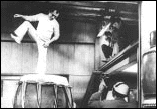|
|
 |
Production Company: Seirinsha Producer: Yamagami Tetsujiro Director: Koike Masato Photography: Ichinose Masashi Sound: Takizawa Osamu Music: Komuro Hitoshi Narrator: Ito Soichi Song--Lyrics from: A poem by Langston Hughes Music Composed by Komuro Hitoshi 1986 / Color / 16mm / 80 min |
| A man who works at an Osaka post office received a very threatening letter. The man, a resident of one of Japan's buraku communities, is afraid to walk alone at night. The existence of this kind of threat along with discrimination in employment and marriage make it clear that even today unfair treatment of people from buraku areas persists. However, the long history of the movement has produced results in terms of housing reform, and in the buraku area shown in the film, the kind of poverty that used to exist with row after row of poorly made apartment houses is no longer to be seen. One gets the impression that the people who previously lived in sunless buildings now live in bright new apartments, and at the same time the sense of communality is thinning. Meanwhile, one family that moved to this area from Minamata undertakes the battle against discrimination for the first time. People from outside the buraku area also encounter many problems. For instance, a husband tells of his wife who is not from the buraku and whose parents had her removed from her family registry. One day a man visits the school his daughter attends to tell them what it is like to work at a slaughterhouse. "If someone does not slaughter the cow, we could not eat meat" he tells them. Then we hear the sound of a taiko drum from a festival taking place in a buraku where the hide for the drum heads is produced. The director of this film, Koike Masato, has worked for Tsuchimoto Noriaki as an assistant director. |